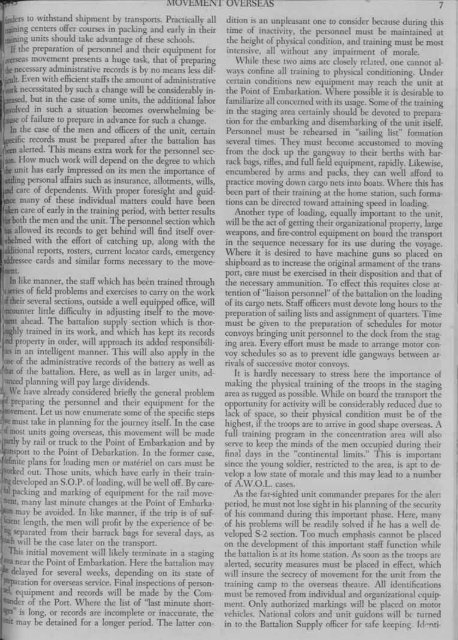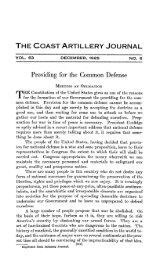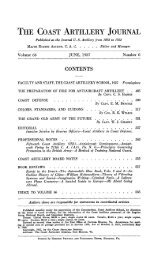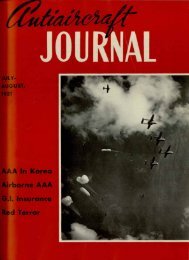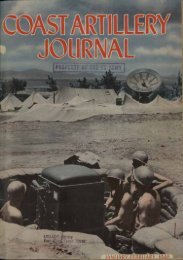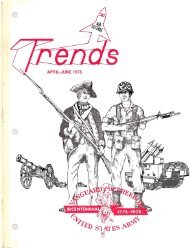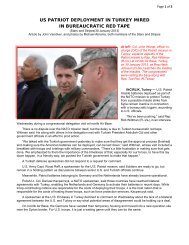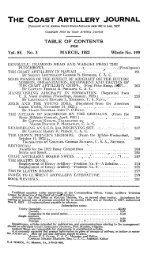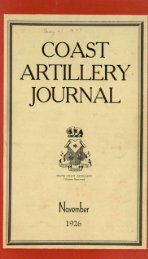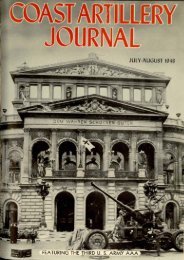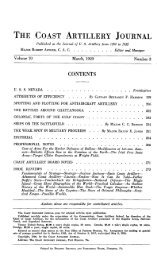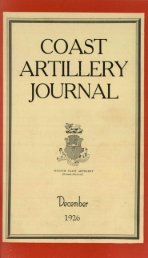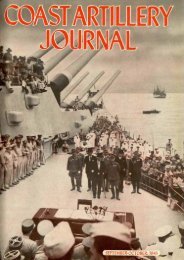July-August - Air Defense Artillery School
July-August - Air Defense Artillery School
July-August - Air Defense Artillery School
You also want an ePaper? Increase the reach of your titles
YUMPU automatically turns print PDFs into web optimized ePapers that Google loves.
iPders to withstand shipment by transports. Practically all<br />
'ning centers offer courses in packing and early in their<br />
'ning units should take advantage of these schools.<br />
If the preparation of personnel and their equipment for<br />
(ll'erseasmovement presents a huge task, that of preparing<br />
the necessary administrative records is by no means less dif-<br />
It. Even with efficient staffs the amount of administrative<br />
k necessitated by such a change will be considerably insed,<br />
but in the case of some units, the additional labor<br />
volved in such a situation becomes overwhelming beuseof<br />
failure to prepare in advance for such a change.<br />
In the case of the men and officers of the unit, certain<br />
ific records must be prepared after the battalion has<br />
alerted. This means extra work for the personnel sec-<br />
1IDI1. How much work will depend on the degree to which<br />
unit has early impressed on its men the importance of<br />
ding personal affairs such as insurance, allotments, wills,<br />
care of dependents. "Vith proper foresight and guidce<br />
many of these individual matters could have been<br />
kencare of early in the training period, with better results<br />
both the men and the unit. The personnel section which<br />
s allowed its records to get behind will find itself overwhelmedwith<br />
the effort of catching up, along with the<br />
itional reports, rosters, current locator cards, emergency<br />
dressee cards and similar forms necessary to the moveent.<br />
In like manner, the staff which has been trained through<br />
seriesof field problems and exercises to carryon the work<br />
their several sections, outside a well equipped office, will<br />
counter little difficulty in adjusting itself to the move-<br />
nt ahead. The battalion supply section which is thorghly<br />
trained in its work, and which has kept its records<br />
d property in order, will approach its added responsibililIeS<br />
in an intelligent manner. This will also apply in the<br />
~<br />
caseof the administrative records of the battery as well as<br />
thatof the battalion. Here, as well as in larger units, adneedplanning<br />
will pay large dividends.<br />
We have already considered brieRy the general problem<br />
preparing the personnel and their equipment for the<br />
vement. Let us now enumerate some of the specific steps<br />
must take in planning for the journey itself. In the case<br />
most units going overseas, this movement will be made<br />
plnly by rail or truck to the Point of Embarkation and by<br />
nsport to the Point of Debarkation. In the former case,<br />
nnite plans for !oading men or materiel on cars must be<br />
rked out. Those units, which have early in their traingdeveloped<br />
an S.O.P. of loading, will be well off. By careful<br />
packing and marking of equipment for the rail movelllent,many<br />
last minute changes at the Point of Embarkan<br />
may be avoided. In like manner, if the trip is of suf-<br />
~ent length, the men will profit by the experience of beg<br />
separated from their barrack bags for several days, as<br />
h will be the case later on the transport.<br />
This initial movement will likely terminate in a staging<br />
~ near the Point of Embarkation. Here the battalion may<br />
delayed for several weeks, depending on its state of<br />
eparation for overseas service. Final inspections of personlei,<br />
equipment and records will be made by the Com-<br />
!lander of the Port. "\There the list of "last minute short-<br />
Iges" is long, or records are incomplete or inaccurate, the<br />
it may be detained for a longer period. The latter con-<br />
r\IUVt.l\It.i\: 1 OVERSEAS 7<br />
dition is an unpleasant one to consider because during this<br />
time of inactivity, the personnel must be maintained at<br />
the height of physical condition, and training must be most<br />
intensive, all without any impairment of morale.<br />
\Vhile these two aims are closeh' related. one cannot always<br />
confine all training to physi~al conditioning. Under<br />
certain conditions new equipment may reach the unit at<br />
the Point of Embarkation. Where possible it is desirable to<br />
familiarize all concerned with its usage. Some of the training<br />
in the staging area certainly should be devoted to preparation<br />
for the embarking and disembarking of the unit itself.<br />
Personnel must be rehearsed in "sailing list" formation<br />
several times. They must become accustomed to moving<br />
from the dock up the gangway to their berths with barrack<br />
bags, riRes, and full field equipment, rapidly. Likewise,<br />
encumbered by arms and packs, they can well afford to<br />
practice moving down cargo nets into boats. \\There this has<br />
been part of their training at the home station, such formations<br />
can be directed toward attaining speed in loading.<br />
Another type of loading, equally important to the unit,<br />
will be the act of getting their organizational property, large<br />
weapons, and fire-control equipment on board the transport<br />
in the sequence necessary for its use during the voyage.<br />
Where it is desired to have machine guns so placed on<br />
shipboard as to increase the original armament of the transport,<br />
care must be exercised in their disposition and that of<br />
the necessary ammunition. To effect this requires close attention<br />
of "liaison personnel" of the battalion on the loading<br />
of its cargo nets. Staff officers must devote long hours to the<br />
preparation of sailing lists and assignme!1t of quarters. Time<br />
must be given to the preparation of schedules for motor<br />
convoys bringing unit p.ersonnel to the dock from the staging<br />
area. Every effort must be made to arrange motor con.<br />
voy schedules so as to prevent idle gangways between arrivals<br />
of successive motor convoys.<br />
It is hardly necessary to stress here the importance of<br />
making the physical training of the troops in the staging<br />
area as rugged as possible. \i\Thile on board the transport the<br />
opportunity for activity will be considerably reduced due to<br />
lack of space, so their physical condition must be of the<br />
highest, if the troops are to arrive in good shape overseas. A<br />
full training program in the concentration area will also<br />
serve to keep the minds of the men occupied during their<br />
final days in the "continental limits." This is important<br />
since the young soldier, restricted to the area, is apt to develop<br />
a low state of morale and this may lead to a number<br />
of A.W.O.L. cases.<br />
As the far-Sighted unit commander prepares for the alert<br />
period, he must not lose sight in his planning of the security<br />
of his command during this important phase. Here, many<br />
,of his problems will be readily solved if he has a well developed<br />
S-2 section. Too much emphasis cannot be placed<br />
on the development of this important staff function while<br />
the battalion is at its home station. As soon as the troops are<br />
alerted, security measures must be placed in effect, which<br />
will insure the secrecy of movement for the unit from the<br />
training camp to the overseas theatre. All identifications<br />
must be removed from individual and organizational equipment.<br />
Only authorized markings will be placed on motor<br />
vehicles. National colors and unit guidons will be turned<br />
in to the Battalion Supply officer for safe keeping. H'nti


